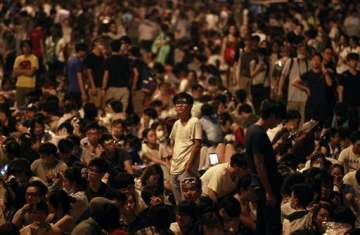China warns of chaos if Hong Kong protests persist
Hong Kong: China warned of “chaos” and threw its weight behind Hong Kong's embattled leader in his face-off with pro-democracy protesters who have threatened to occupy government offices unless he steps down by the end

Hong Kong: China warned of “chaos” and threw its weight behind Hong Kong's embattled leader in his face-off with pro-democracy protesters who have threatened to occupy government offices unless he steps down by the end of Thursday.
The People's Daily, the mouthpiece of the ruling Communist Party, said in a commentary Thursday that the “central government fully trusts Chief Executive Leung Chun-ying and is very satisfied with his work.”
It added that it firmly supports the Hong Kong police—criticized for using tear gas and pepper spray on the protesters last weekend—“to handle illegal activities in accordance with the law.”
The weeklong street protests by thousands of demonstrators pressing for freer elections in Hong Kong are the biggest challenge to Beijing's authority since China took control of the former British colony in 1997.
They oppose the Chinese government's decision in August that all candidates in an inaugural 2017 election for the territory's top post must be approved by a committee of mostly pro-Beijing local elites. They say China is reneging on its promise that the chief executive would be chosen through “universal suffrage.”
Student leaders who have played a key role in organizing the protests initially wanted to meet with Leung, but after Sunday's clashes with police, they have stepped up calls for his resignation and asked that the central government in Beijing heed their demands for genuine democratic reforms.
Raising the stakes of the stand-off, student leaders demanded Wednesday that Leung resign by midnight Thursday. If he doesn't, they said they would step up their actions, including occupying government buildings.
That raised the specter of another clash with police, who have been guarding various government buildings. Since Monday, the protests have been peaceful.
On Thursday morning, several dozen mostly student-age protesters were trying to block the road outside the entrance to the chief executive's office in the government complex. Police manned barricades at a nearby intersection, with protesters camped on the other side, huddling under umbrellas.
“We are not asking C.Y. to come talk to us. We are demanding he resign,” said May Tang, a 21-year-old student at Lingnan University, referring to Leung. “It's too late for his government to be accountable to the people so we want a new one.”
One protester disagreed with the student leaders' threat to occupy government buildings.
“Getting into a confrontation with police doesn't seem peaceful to me,” said Wilson Yip, a 22-year-old recent university graduate. “If they try to force themselves inside and confront police, I don't see what kind of point that would make. It may make fewer people support the protests.”
The Chinese government appeared to be losing patience. An editorial solemnly read Wednesday evening on state TV said all Hong Kong residents should support authorities in their efforts to “deploy police enforcement decisively” and “restore the social order in Hong Kong as soon as possible.”
In the commentary published Thursday, the People's Daily said that the rule of law must be safeguarded “in order to realize the healthy development of democracy and politics in Hong Kong.”
“Handling affairs without following laws, Hong Kong society will be in chaos,” it warned.
The protesters, it said, had “flagrantly violated Hong Kong's law and regulations, seriously blocked traffic and disrupted social order. They have put a handful of people's political demands above the law, even hijacked the will of Hong Kong people for their personal interests.”
In Washington, Secretary of State John Kerry met with Chinese Foreign Minister Wang Yi and said the U.S. supports the “highest possible degree of autonomy” in Hong Kong. He said he hopes Hong Kong authorities exercise restraint and allow the protesters to express their views peacefully.
Wang said that the protests are “China's internal affairs” and that no country would allow “illegal acts” against public order.